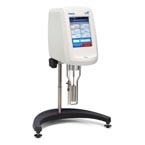Rotational Viscometers And Rheometers

The rotational viscometer is used to determine the flow characteristics of the asphalt binder to provide assurance that it can be pumped and handled at the hot mixing facility. Use of the viscometer is necessary to evaluate the various types of asphalt binders used in SUPERPAVE mix designs. Rotational viscosity is determined by measuring the torque required to maintain a constant rotational speed of a cylindrical spindle while submerged in an asphalt binder sample at a constant temperature.
This torque is directly related to the binder viscosity, which is calculated automatically by the unit. These units are also capable of developing temperature-viscosity charts for estimating mixing and compaction temperatures. The versatile RVDV-II+ units are programmable and capable of downloading up to four test programs via your PC. RS232 interface provides automatic data gathering with a PC or printer. 54 user selectable speeds - .01 to 200 rpm- provide variable shear rate capability for precise rheological testing. One-key program operation for repetitive testing in QC and R&D. Senses and displays continuously; Viscosity (cP or mPa•s), Temperature (°C or °F), Speed (rpm), Shear Rate/Shear Stress (with cone/plate or coaxial cylinder geometry), %torque. Comes with direct output to chart recorder and has accuracy of ± 1.0% or range, repeatability: ± -0.2%. Optional WINGATHER™ software provides an easy means to gather data and create permanent test records.
The RVDV-III+ units are the most advanced instruments for measuring and analyzing rheological change by providing rotation speeds from 0.01 to 250 rpm equating to shear rates of .002 to 1875 sec_¹. Optional RHEOCALC™ software allows operation from a remote PC and provides analysis of the accumulated data. Programmable and capable of downloading 10 programs via keypad or PC. Has a parallel port to connect a printer and a serial port to connect printer, PC or support programmable controller for Thermosel. Both units can be used in conjunction with Thermosel for precise temperature control within ± -0.5% of set-point temperature and excellent viscosity reproducibility.


